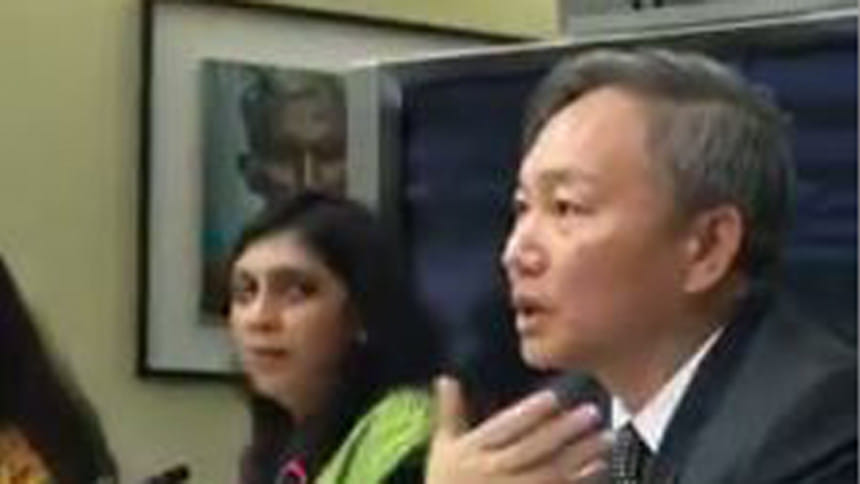Refugee Crisis: WB offers $400m, Japan gives $3m

Bangladesh can avail as much as $400 million from the World Bank as grants if it rolls out programmes exclusively for the Rohingya refugees and the hosting communities, the bank's country chief said yesterday.
"The World Bank stands ready, I want to repeat the World Bank stands ready to support the government in addressing the growing refugee crisis if the government seeks the World Bank's assistance," WB Country Director Qimiao Fan told reporters at his office in Dhaka.
He made the comments while speaking at the release of the Bangladesh Development Update. Zahid Hussain, lead economist of the WB Bangladesh, delivered the keynote presentation.
Qimiao said the money would come from a new window opened under the current round of the WB's cheap loans for the poor countries.
The bank in its first-ever move of such kind has allocated $2 billion for the sub-window for refugees within the International Development Association (IDA) for those seeking refuge in different parts of the world, under which any nation can get a maximum share of $400 million.
Qimiao said any official request in this regard would have to come from the official channel which is Economic Relations Division.
The WB was very much concerned about the plight of Rohingya people who were forced to leave their homeland because of conflict and violence, he added.
"The World Bank is monitoring the situation together with the UN organisatios and other development partners."
To get the financial assistance, IDA countries (those who get loans from the IDA) must host more than 25,000 refugees, have adequate refugee protection framework and action plans.
In terms of hosting refugees, Bangladesh qualifies for the loan.
"Bangladesh has some policy framework in place to deal with the refugee issue. The exact amount will depend on needs and the country's capacity to absorb in the short-term," Qimiao told journalists.
For programmes targeting only refugees, 100 percent grant can be considered on a case-by-case basis.
"In some cases, if countries choose to have that support to be focused entirely on helping refugees, then on a case-by-case basis there may be a 100 percent grant," the WB official said.
Bangladesh has already sought $250m from the WB to provide health services to Rohingya refugees, State Minister for Health Zahid Malik said on Monday.
Asked whether the influx of Rohingyas would affect Bangladesh's economy, Qimiao said there would be a need to increase spending in the short-term. There would be a significant pressure on service delivery in the hosting communities in areas such as access to health, education, water and sanitation, he added.
"I think it's difficult at this stage to tell exactly what would be the impact on the economy. The situation is evolving and evolving rapidly. It is clear in addition to the immediate humanitarian assistance, the government will need to address some long-term support that will be needed to help the refugees and also the hosting communities."
Zahid Hussain said the influx of Rohingyas would definitely put an unexpected pressure on the economy. "But we're yet to make any estimate regarding the impact of this on the economy."
Bangladesh has received a huge number of Rohingya refugees fleeing persecution in Myanmar's Rakhine state since August 25.
On Tuesday, the UN put the number of Rohingya refugees at 4,80,000.
JAPAN TO PROVIDE $4M
Japan will provide $4 million as an emergency grant aid for the hundreds of thousands of displaced people in Bangladesh and Myanmar, reports our diplomatic correspondent.
According to diplomatic sources, of the total grant, $3 million would go to the forcibly displaced Myanmar nationals in Bangladesh and the rest to the internally displaced people in Rakhine.
"On September 26, the Government of Japan decided to extend Emergency Grant Aid of 4 million US dollars, through agencies including International Organisations, for the people in Myanmar and Bangladesh affected by the attacks carried out against the security forces on August 25 and subsequent destabilisation of the situation in the northern part of Rakhine State, Republic of the Union of Myanmar," according to a press release of the Japanese foreign ministry.
"This Emergency Grant Aid is to provide humanitarian assistance such as provision of water, sanitary and non-food items in Myanmar and provision of shelters, non-food items, water, sanitary and child protection in Bangladesh," it added.
Earlier on March 28, the Japanese government had extended an emergency grant aid of $2 million to newly-arrived displaced people in Bangladesh, who were affected by the "destabilised situation" in Rakhine.

 For all latest news, follow The Daily Star's Google News channel.
For all latest news, follow The Daily Star's Google News channel. 








Comments